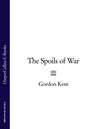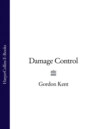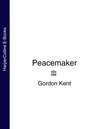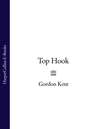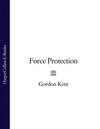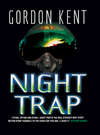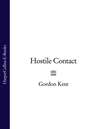Читать книгу: «The Spoils of War», страница 3
The policewoman at the inquiries desk spoke better Hebrew than she did English, but she wrote some things down and got on a telephone. Meanwhile, a plain-clothes detective was looking Alan over and probably realizing that he wasn’t armed—Alan, like most of the men in Tel Aviv, was wearing a short-sleeved shirt and slacks—while Alan was looking him over and deciding that the extra tuck on the right side of his shirt covered an in-the-waistband holster, and his slightly cocked left foot might suggest an ankle gun.
People went by as if they were heading for a somber event, heads down, moving fast. The space was big, harshly echoing, lighted with banks of fluorescents overhead; the noise of footsteps was like some sort of clattering engine. Move, move, the noise, the atmosphere seemed to say; get in and get out, don’t linger, we’re serious here.
“Commander Alan Craik?”
The man was blond, chunky, purposely likable. He had a Browning nine-millimeter in a very visible shoulder holster and he smiled as if he really was glad to see Alan. Maybe he was simply glad to see anybody who would allow him to strike an item off his to-do list. “Detective Sergeant Berudh.”
They shook hands. Berudh led him toward a bank of elevators, one hand behind Alan’s left arm; he was chattering about the building—how big it was, how many different offices it housed, how many crimes they covered a day. “You’re US Navy,” he said abruptly. “Not from a ship, I think.”
“No, not from a ship.” Habit kept him from saying where he was stationed just then. Which was absurd, of course, because the Israelis would already know. And they were allies. More or less.
Berudh was silent in the elevator, surrounded as they were by worried-looking people who were certainly not police. The elevator smelled of nervousness, Alan thought. Then two young women got on, smiling, bouncy, and chattered as the elevator rose. They worked there and seemed to say, “What is there to be nervous about?”
“Only the police are at home in a police station,” he said when they got off.
“And why not? Everybody’s guilty about something.” Berudh led the way down a corridor. “Most of them are here for permits, licenses, getting papers stamped, but they feel guilty. Actually, it makes the job easier.” He held a door open. “You’re NCIS?”
Alan explained that he had a badge but it was left over from earlier duty. “The special agent in charge of NCIS, Naples, asked me to do this for him.”
“Scut work,” Berudh said and gave him the smile. Berudh spoke American English with a slight accent, clearly knew American slang. “We work with NCIS when there are ships in Haifa, stuff like that. Sailors come down here, get in the usual trouble sailors do, we have to arrest them, blah-blah-blah. But we’re all friends.”
He was leading Alan through a room that had half a dozen desks in it, fluorescent lights overhead, a computer on each desk and a man or woman working at each one. More guns were in evidence here, some hung in their holsters on chairbacks.
“Okay.” Berudh sat behind the only empty desk, pulled a metal chair over for Alan. He offered coffee or tea or soda, told a quick joke, surprised Alan by asking to see his ID. “I know you ID’d yourself at the door and at reception, but it’s a rule. Death is serious business, isn’t it?” He looked over the passport and the badge, made some notes, and sat back. “Okay.”
He had a thin pile of photocopies and computer printouts. He began to hand them across the desk, naming each one as he did so—“Initial contact sheet—log sheet—physician’s report—death certificate—telephone log, that’s only to show when we notified your embassy—” The pages were clean, all typed, neat, efficient, but in a language Alan couldn’t read. Berudh explained that Qatib, Salem, had begun his police connection as an unidentified corpse in Jaffa, another of Tel Aviv’s sub-districts, then been logged in as a homicide, then identified from missing-person calls placed by his family.
Alan could have taken the papers then and left, but a perverse sense of duty made him ask questions he wasn’t at all interested in. “How come if he was found in Jaffa, you’re handling it here?”
“Question of internal politics.” Berudh made a face. “Yarkov District claims control over all cases of wrongful death. Not that we handle them all. Our homicide people are very territorial.”
“How long had he been missing?”
“Unh—” Berudh half-stood and leaned over to look at Alan’s pages. “You’ve got a page from our missing-persons log—it’s small type, very dense—” Alan held up a page; Berudh squinted at it and said, “I think the first call came in about eleven p.m.” Berudh rattled through a translation of the missing-persons page: a woman’s voice had made the first call, identified herself as a girlfriend; the victim hadn’t turned up for dinner at his cousin’s. They looked at the physician’s report. The man had been dead an estimated seven to twelve hours when the doctor had examined him.
“But no autopsy,” Alan said.
“No, no, no. Arabs are against that.”
“Can I see the body?” He hoped the answer was no.
“We released him to the family pretty much as soon as the doc was through with him. Off to the West Bank.” Berudh raised his hands. “Coffin was closed.”
Something pinged in Alan’s brain but didn’t quite connect, and he said lamely, stalling until the connection was made, “You don’t have a suspect.”
“At this point, no. Mugging? Girlfriend? Palestinian infighting?” He shrugged. “This guy was in your Navy, but a Palestinian can be into anything. Hamas, Fatah—he could have had a suicide belt stashed someplace, chickened out, got punished. They’re all fanatics.”
Alan signed a paper that said that he had in fact received all the stuff in his hand, and Berudh, smiling again, gave him a dark blue plastic folder with something in Hebrew on it and TLVPD in English in white letters. “It’ll keep them neat; they blow in the wind, you know; we always have a breeze, it’s the sea—that’s Tel Aviv, my friend, the Fort Lauderdale of the eastern Med—” He was seeing Alan to the elevator, explaining twice how to get out of the building, assuring him that if there was anything, anything he could do—and was gone.
In the vast lobby, assaulted again by the clatter of echoes, Alan crossed among the worried people heading for the elevators and looked with relish at the thin slice of the outdoors that showed through the guarded entrance. Guilt. Even when you weren’t guilty of anything, you felt it. He thought of September eleventh: Yes, it’s guilt, as if I could have stopped it. Which was nonsense.
It was at that point that his brain made the connection he’d missed earlier. According to the two-page file Dukas had faxed him—Qatib’s short personnel record and an ID sheet—he had had family in the States. But the body, Berudh had said, had been sent to the West Bank. Maybe the family had moved back? Or the parents had divorced and one had come back? Or—?
Instead of leaving the police building, ignoring Dukas’s plea not to be an intel officer, he went to the information desk and said to the same young woman, “I’d like to talk to somebody in Homicide.” Why hadn’t he asked to see Berudh again? he wondered. Because you check one source against another. He pointed at the signature on the first page in the blue folder Berudh had given him. “This person,” he said, figuring that one way in was as good as another.
3
Gaza City, Palestinian Authority
He wasn’t sure where he was—somewhere in the territories. The interrogation room smelled of mold. It was underground, the white paint on the walls peeled away from the concrete in long strips, exposing the rough surface beneath. It was too bright, lit by a pair of hot halogen lights, so that cockroaches threw sharp shadows on the floor where they scuttled.
Rashid had been waiting there for three hours. He had surprised himself by falling asleep. He had woken up to find that the persistent itching on his leg was an insect that had crawled up his jeans. He panicked, flailed around the room getting the unclean thing out of his clothes.
Then he sat, his arms crossed on his chest, and waited.
He heard steps in the hall, conversations, snatches of laughter, once, a startled scream.
More steps in the hall, sharper, and the click of a woman’s heels. His door opened.
There was a man and a woman. The man was middleaged, thin, smoking. The woman was younger, but not by much, wore heels and a short skirt.
Men with guns brought two chairs.
“I am Colonel Mahmoud Hamal and this is Zahirah,” the man said. “You are Rashid George Halaby?”
Rashid nodded.
“You know who I am?”
Rashid shook his head.
“Perhaps you have heard me called the Tax Collector. Hmm? I am responsible for the security of our Palestinian Authority in regard to antiquities. You work for Hamas?”
The question pierced through Rashid’s other fears; something to be dreaded, something for which he had not prepared an answer. So he said nothing, tried to keep his eyes down. He had heard of the Tax Collector. Salem had mentioned him—feared him, even.
“How long have you been with Hamas?” Colonel Hamal was looking at a manila folder.
Rashid looked at him with lowered eyes. The colonel was wearing a suit, had a silk tie, and a heavy gold ring on his finger. Rashid blinked to keep tears off his face.
The colonel waved the folder at him. “You are Rashid George Halaby. You live in Haifa. You run errands for Hamas. You had two brothers killed in the Intifada by Jewish soldiers. Your father died in Jordan in a riot. Your mother teaches at a Muslim school. Why not just say these things?”
Unbidden, Rashid’s eyes rose and met the colonel’s. The man smiled.
“You have an Israeli passport. As far as I can tell, you have never been arrested in Israel. Are you a Muslim?”
Rashid nodded.
“How do you come to have an Israeli passport?” the woman asked. Her voice was warm, her Arabic slightly accented.
“We live in Acco. Not Haifa.” Rashid spoke softly, as if he was afraid he might be overheard. They must know these things. Haifa was an Israeli town. Acco had a big Palestinian population, one of the biggest in Israel. “I’m a Palestinian.”
The man waved his hand, his attention still on the documents. “Acco, then. Either way, you are not from Gaza or the West Bank. You have an Israeli passport.” Hamal threw it on the table in front of the boy. “Why didn’t you proclaim it? I have no jurisdiction over you.”
Rashid couldn’t think of a reply. He couldn’t think at all. All answers were going to lead to the same place—Hamas, Salem, Hamas, Salem. Had he killed the man with the hammer? Did they know? He shrugged, the motion stiff. Rashid rubbed the back of his hand over his face, rubbed his lips. The arresting officers had not been gentle.
“What were you doing here?” Hamal paused for effect. “In Gaza?”
“Working. With a friend.” Rashid thought that sounded harmless, but both the man and the woman smiled.
“What were you working on?”
Rashid’s lips trembled.
“How long have you been with Hamas?” Hamal asked again.
“Since my brothers died.” Rashid answered savagely.
Hamal nodded. He smoked for over a minute. “You were working with a friend. Digging, perhaps?”
Rashid didn’t know what to say, because these people seemed to know so much. And he had no idea what they wanted. But after too long a hesitation, he said, “Yes,” softly.
The woman leaned forward across the table. “Is your friend Salem Qatib, Rashid?”
Rashid gave himself away with his reaction, and read it on them. But the mention of the name caused much of the fear to drop away. They were in it now. He raised his eyes, met hers. She was attractive; her eyes were big and friendly. She wore scent.
“Yes,” he said.
“How well do you know Salem Qatib?” Colonel Hamal asked.
Rashid squirmed. “We are friends.”
Hamal rustled his papers and glanced at his watch.
“He—he played with my oldest brother—when they were boys,” Rashid said.
Hamal didn’t look up from the dossier in front of him.
“Then—then he went away to—America,” Rashid said. “When he—Salem—came back, he came to visit my mother.”
The woman nodded her understanding.
Rashid went on, “He wanted to offer my brother a job, but Ali—was dead. So he took me instead.”
“Tell me about that job.” The woman leaned forward, and her scent covered the smell of mold and made the room a better place. It was not a smell of sex, but of flowers.
“We dug. For old things, antiquities.” Rashid knew he was committed now, had said too much, but their expressions didn’t change and he had nothing to lose. They were interested in Salem. So was he. “Salem would identify a site, and we would dig by hand. If there were things, then other men would come, but we would do the fine work.” Rashid tried to express the fine work by brushing the table with his fingers. “With a toothbrush? You know? And sifting. The other men would never sift, they wanted to use a backhoe for everything.”
“And Hamas told you to take the job.” Hamal was leaning forward too, his cigarette smoke cutting through the woman’s perfume. She waved at the smoke, but her eyes stayed with Rashid.
Rashid wrapped himself in his arms again and sat quietly. Because it was true, and because it was a betrayal of Salem before he even knew Salem.
“You had to, yes? Your mother would have asked you to do this work for them.” Zahirah sounded concerned. Perhaps she, too, despite her modern clothes, was a mother.
“They took care of us when my father died.”
“Of course. And you—what? You reported to them on what Salem found?”
Rashid put his face in his hands. He sobbed, “Not after we were friends! I—” he gulped air, swallowed the word loved. “We were friends.”
She nodded. Hamal leaned across her. “You were at the dig at Tel-Sharm-Heir’at?”
Rashid nodded. He could see the dig, the pit facing the sea, and everything covered with blue tarps against the winter rain. The row of burial urns that started them on the site. The stone structure nearest the sea that had electrified Salem.
“You were there when Qatib was beaten?” Hamal asked.
“I—ran.” The beach full of men. Salem kneeling, hit with a shovel. The bearded man he hit with a hammer.
Zahirah nodded. Hamal made a mark in the manila folder.
“Salem Qatib is an archaeologist, yes?” Hamal asked.
Rashid was still on the beach in his mind. His hands were shaking again, but his voice was steady. “He went to school in America.”
“He entered the Masters program in Archaeology and Ancient Studies at the University of Michigan,” Hamal said. “Which means that he is, in fact, an archaeologist. I would like to hear you confirm that, Rashid.”
“Yes, he is an archaeologist.”
“He is conducting an illegal dig.”
“Are there legal digs here?” Rashid surprised himself. But he wasn’t as afraid as he had been.
The woman, Zahirah, raised her carefully plucked brows. The man smiled, grunted a laugh. “Digs are legal if we license them. Hmm? And if not—then we seize them.”
Rashid looked at the table in front of him, because he now knew who had taken and beaten Salem. His sweat turned to ice, his relaxation vanished.
“You—” he began. He started again. “Where is Salem? Have you arrested him?” And he thought Do they know I hit the man with a hammer?
Hamal took a drag on his cigarette, exhaled to the side, away from Zahirah. “We seized the dig at Tel-Sharm-Heir’at. We do not have your friend Salem. Do you know that Salem Qatib was abducted that night? After my men took the site?”
Rashid put his hands out, grabbed the table as if he might slide off his chair. “No.”
“He was taken by Israelis, Rashid. Do you know anything about that?”
“No! No!” Rashid’s head went back and forth between them.
“And they killed him.” Hamal’s voice was brutal.
Rashid sat in shock.
Tel Aviv
Alan Craik and a woman detective named Miriam Gurion were sitting in a cubicle in the homicide detectives’ “room,” really a space big enough to play basketball in. She was in her late forties, he thought, her face lined by sun and wind, her hair gray. She spoke English well but with an almost-swallowed “r” that sometimes disappeared into her throat.
“How do you know I was lied to?” he said. He watched her eyes, which met his honestly enough but flicked away to each side; she had the head movements, too, of the watcher who is always checking the periphery. The watchfulness of a cop in a place where bombs go off. Or of a detective of homicide who thought the walls had ears.
“The 27-14,” she said. “The 27-14 is a routine piece of paper, but it has to be signed when we say it’s a homicide—and that’s my name on it, and in fact I signed it.” She leaned toward him over her messy desk and lowered her voice. “Two years ago.”
Behind her, three cat photos and five people photos were stuck to the cubicle wall; the people, he had already figured out, were the same two, young and older, one also in a wedding dress—her daughters?
“Let’s go for coffee,” she said.
“Yeah, but I don’t—”
“I don’t say another word in here.” She was almost whispering. She led him out a side door of the building to a sidewalk café a block away, not mentioning Salem Qatib or the paper or what she had meant by “two years ago.”
He ordered coffee, she a soda. While they waited, she lit a cigarette and puffed and simply shook her head when he tried to talk. She blew out smoke and he unconsciously waved it away. “Oh, you’re one of those,” she said and turned sideways to him, holding the cigarette low on her street side. The waiter put the coffee and the soda down between them and hovered, and she made a shooing gesture. When he was gone, she said, “Tell me about this detective who gave you the papers.”
“What’s your interest?” he said.
She grunted. “My interest is my job.” She puffed, exhaled out of the street side of her lips. “My interest is in living in a good country, where the cops don’t tell lies. This detective you talked to told you lies.”
He told her about Berudh, described him, his office. She said, “Mossad.” When he looked skeptical, she said, “He has to be a Mossad liaison. We have to work with them, but they’re bastards. So they lied to you.” She got out another cigarette, played with a cheap lighter, said, “I didn’t want to say these things at Dizengoff Street. You understand. But faking a homicide file, that’s serious business.”
“You don’t know it’s faked.”
She sighed. She held out her hand. He didn’t get it. She moved the hand impatiently, then lit her new cigarette, put the hand out again. He gave her the blue folder with the papers Berudh had given him.
Miriam Gurion opened the papers on the café table and put her head low over them as if she were near-sighted. She smoked and turned pages, separating them into two stacks. “This is bullshit,” she said. “You believe in feelings? I get bad feelings.” She stubbed out the end of the cigarette and burrowed for another in her huge handbag. With her head, she indicated one of the piles she had made. “These papers, you see them? They’re authentic—I know, because they’re from a case I had two years ago. That’s what I meant, I signed the 27-14 two years ago—these are all from another case.” She touched the other pile. “These are new, mostly dreck. See, your Berudh or somebody dug out my old case, probably scanned the file into a computer, printed it out, blocked out the name and the date, typed in new ones, rescanned—and here we are! A nice case file on somebody named Qatib, Salem, to give to the nice American officer who only wants to get it over with so he can go home. Eh?”
She lit a new cigarette and leaned back, smoking, her eyes on the street, and then she said without looking at him, “I don’t believe this crap about your guy, what’s his name—Qatib—being taken to the West Bank for burial. The family is in the US, you said? So the burial story is bullshit. I think maybe so is the story about people calling him in missing; we’ll check this. Right now.” She got a cell phone from the overstuffed handbag. Alan figured there was a gun in there somewhere, too; could she ever find it if she needed it? She punched in numbers, said to him, “I think we need to work together.” Then she was barking Hebrew into the cell, touching new numbers, making another call.
When she was done, she threw the phone into the handbag’s open maw and stubbed out the cigarette and lit another. “The file on my two-year-old case is checked out from storage. Okay? Also, there’s nothing in the missing persons log for any calls last night about Qatib, Salem.” She put a hand on one pile of paper. “All bullshit.”
“Okay. Why?”
“You tell me, darling.” She blew out smoke. “What a bloody mess! I’m going to have to open a file, new case, plus file a complaint against your Berudh, plus I got no body—” She sat back and puffed, then looked at the papers she had said were from her old case and said, “Maybe we go find a body.” Smiled.
“Qatib?”
Her open hand, turned upward, floated over the table. “Why do they pick my case to do their faking? Chance? No. Something against me? No. Then why? Very fast work, darling, doing all this between about midnight and this morning. So they pick my case because a lot of the work is done for them already, nu?” The hand closed into a fist. She laughed. “Two things: somebody knew my old case, remembered it, and maybe there was a connection. Like the same people found the body? Or turned it into a body? Mmm?” She ground the cigarette into her saucer. “Let’s take a ride to Jaffa.”
The coffee was terrible, and Alan didn’t mind leaving the café, but he didn’t get it. “What’s in Jaffa?”
She waved the waiter toward her and scrambled in her bag for money; Alan was late in reaching for his own. “Two years ago, a body was found in an old military barracks there. He was young, Palestinian. I got the case. Mossad waved me off when I seemed to be getting somewhere. Now that case file is being used for the body of another young Palestinian. And here is Mossad again.” She stood. “Maybe Qatib, Salem, ended up in Jaffa.”
He looked at his watch. He had only an hour until he was supposed to meet Rose. Dukas had told him not to behave like an intelligence officer. He’d done enough. “I think I’d have to have more to go on than that.”
She gave him a look that might have been disgust and then sat again and got the cell phone out. She did the numbers, held up a finger, eyebrows arched, as if saying Watch what I’ll pull out of my ass now! She waited, sighed, jerked upright and began to bellow Hebrew into the phone. Then she listened, said something that sounded awfully like the Hebrew for bullshit and closed the phone with a distinct, though small, bang. “He’s pissing his drawers, he’s so scared!”
“Who?”
“The guy, darling, the guy who runs the place in Jaffa where they found the body two years ago! He knows something, and I scared the piss out of him! Are you coming or not?”
He felt as if hands were dragging at him to pull him down into his chair, but he stood and said, “Let’s go,” which was not what he wanted to do at all.
Бесплатный фрагмент закончился.
Начислим
+6
Покупайте книги и получайте бонусы в Литрес, Читай-городе и Буквоеде.
Участвовать в бонусной программе
